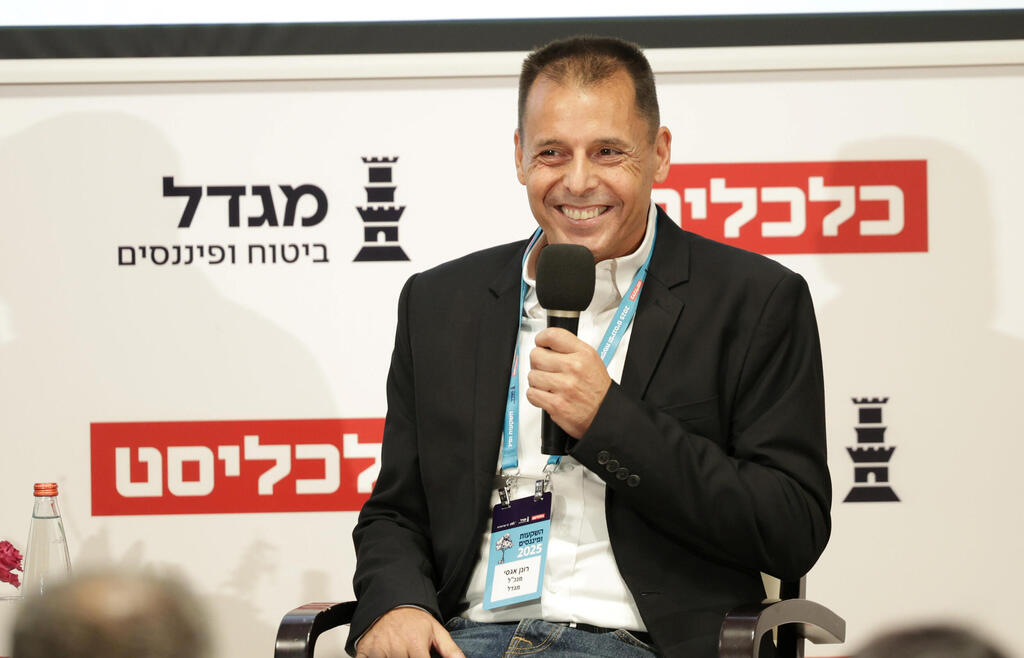Ronen Agassi, CEO of the Migdal Group, told Calcalist’s Yarden Rozanski at the Calcalist and Migdal Investment and Finance Conference that the rally in insurance stocks reflects the strength of the Israeli economy.
The surge in insurance stocks was one of the most prominent stories on the stock exchange in the first half of the year, and it didn’t start there. The insurance index jumped 195% over the last 12 months and, for the first time in recent years, outperformed bank stocks. What’s behind this?
“First of all, insurance companies are on a very long journey that’s tied to the Israeli economy,” Agassi said in his opening remarks. “They are a reflection of the real economy. We provide pensions to people and manage their money, so growth in GDP and wages directly impacts our asset base. There’s also growing awareness of the size, complexity, and structure of our recurring income.”
1 View gallery


Ronen Agassi.
(Photo: Orel Cohen)
“I’m a CPA and was a financial manager for many years, and when IFRS 17 (the new accounting model) came along, my instinct was to say it was just form over substance. But I’ve since reconsidered. One of the key things that has affected our valuations is how complex insurance companies are. We’re very complicated entities, and it’s difficult to understand our profitability, it’s very volatile. The new accounting standards take that even further. We’ve only reported one quarter under IFRS 17, so we’ll learn more over time.”
There’s a tendency in the market for everyone to jump on a trend when something starts working. How much of the insurance rally is driven by sentiment, and how much of it will continue going forward?
“I hope we continue to see a 100% rise in share prices in the coming years. But I believe the entire industry has stepped up in terms of profitability and return on capital. Over time, this is a sector that should generate solid returns for investors, and we still have a long way to go.”
Your most significant role is asset management. The decisions you make shape the entire capital market. When you compare the local market with global options, how does Israel stack up for you?
“A year ago, I said I was very optimistic. A business leader may be optimistic by nature, but I try to be realistic, not just blindly optimistic. I think the Israeli economy has internal strength that even we don’t fully understand. It’s hard to believe some of the numbers, but they show lasting resilience.”
“We’ve been at war for almost two years. Before that, there was a difficult political year with developments that impacted high-tech investments and capital inflows into Israel. And yet, we still see a positive balance of payments, a domestic energy market that meets our needs, continued growth in high-tech, and strong financial institutions. All of this is part of the economic and capital market stability. The economy here holds enormous potential, and that becomes especially clear when we see results like these in such a challenging period. The capital market is a fast and powerful reflection of real expectations.”
“Migdal has a bias toward Israel, and we’re very interested in it. We manage large investment entities, and global diversification is key, so we are global, especially in the U.S. Around 50% of our assets are overseas. But the Israeli economy remains attractive because of solid, fundamental metrics.”
A year ago, you said: ‘I believe the Israeli economy is magical, and when we come out of this situation, we’ll see an explosion.’ We haven’t come out of it yet, but we’ve already seen an explosion. Still, the structural issues remain, there’s polarization and limited trust in the country’s economic leadership. Do you still believe in that ‘magic’?
“Yes. I said the Israeli economy is like a company that delivers great results despite average management. That’s our internal strength. Something here is bigger than any one event or crisis. What worries me is the long-term cost, massive reserve days, losses, and a security budget at this scale. But our foundation is strong. I hope we all come out of this quickly and that polarization gives way to inclusion and dialogue. When that happens, we’ll see the benefits in many areas.”
What are you most interested in investing in right now?
“Put the money where it makes money. In Israel, we invest for the long term. Most of the funds we manage go into pensions. We pay pensions to people who consume in shekels, so it’s very relevant to match that with Israeli investments. We’ve made major investments in rental housing, beyond just economic returns, it’s a sector in short supply in Israel, and the potential is enormous. It also addresses the high cost of housing and the difficulty young couples face in securing down payments. It’s a critical and necessary solution.”
“Retail credit also interests us, we have several collaborations in that space. We’re invested across the economy. We’ve invested in Aral, KCPS, and a number of other major companies in Israel.”
